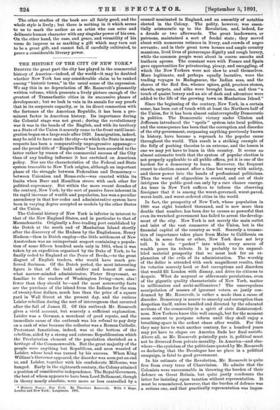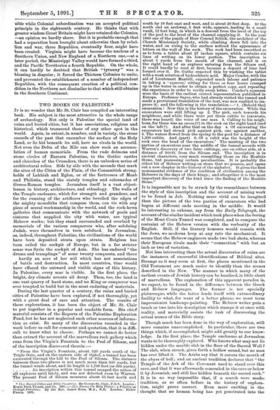THE HISTORY OF THE CITY OF NEW YORK.* DESPITE the
great part the city has played in the commercial history of America—indeed, of the world—it may be doubted whether New York has any considerable claim to be ranked among "historic towns," in the usual sense of the expression. We say this in no depreciation of Mr. Roosevelt's pleasantly written volume, which presents a lively picture enough of the greatest of Transatlantic cities in its successive phases of development ; but we look in vain in its annals for any proofs that in its corporate capacity, or in its direct connection with the fortunes of the American Republic, it has been a pro- minent factor in American history. Its importance during the Colonial stage was not great ; during the revolutionary war it was in the hands of the English, and with its territory as a State of the Union it scarcely came to the front until immi- gration began on a large scale after 1820. Immigration, indeed, may be said to have made the city—to which the State in many respects has been a comparatively unprogressive appanage— and the proud title of "Empire State" has been accorded to the latter rather by reason of the commercial success of the City than of any leading influence it has exetcised on American policy. Nor are the characteristics of the Federal and State system traceable to New York origins, although an important phase of the struggle between Federalism and Democracy— between Unionism and Home-rule—was enacted within its limits when Burr and Hamilton strove with each other for political supremacy. But within the more recent decades of the century, New York, by the sort of passive force inherent in its rapid increase of wealth and population, has won a peculiar ascendency in that her codes and administrative system have been in varying degree accepted as models by the other States of the Union.
The Colonial history of New York is inferior in interest to that of the New England States, and in particular to that of Massachusetts. Originally a free-trading port established by the Dutch at the south end of Manhattan Island shortly after the discovery of the Hudson by the Englishman, Henry Hudson—then in Dutch employ—the little settlement of New Amsterdam was an unimportant seaport containing a popula- tion of some fifteen hundred souls only in 1664, when it was taken by an expedition organised by the Duke of York, to be finally ceded to England at the Peace of Breda,—to the great disgust of English traders, who would have much pre- ferred Surinam. Of the Dutch period, the most interesting figure is that of the bold soldier and honest if some- what narrow-minded administrator, Pieter Stuyvesant, so familiar to the readers of Washington Irving—now, alas ! fewer than they should be—and the most noteworthy facts are the purchase of the island from the Indians for the sum of twenty-four dollars, ranch less than the price of a square yard in Wall Street at the present day, and the curious Leisler rebellion during the sort of interregnum that occurred after the fall of James II. Of this outbreak Mr. Roosevelt gives a vivid account, but scarcely a sufficient explanation. Leisler was a German, a merchant of good repute, and the immediate cause of the outbreak was his refusal to pay duty on a cask of wine because the collector was a Roman Catholic. Protestant fanaticism, indeed, was at the bottom of the rebellion, aided by a strong and extreme Republicanism which the Presbyterian element of the population cherished as a heritage of the Commonwealth. But the great majority of the people were anything but Republican, and soon wearied of Leisler, whose head was turned by his success. When King William's Governor appeared, the disorder was soon put an end to, and Leisler, together with his confederate Milborne, was hanged. Early in the eighteenth century, the Colony attained a position of considerable independence. The Royal Governors, the best of whom appears to have been Lord Bellamont, though in theory nearly absolute, were more or less controlled by a
• Historic Tomes: New York. By Theodore Roosevelt. With 3 Nape. London and New York: Longman*. 1891.
council nominated in England, and an assembly of notables elected in the Colony. The polity, however, was essen- tially aristocratic up to the Revolution, and, indeed, for a decade or two afterwards. The great landowners, or patroons, maintained a sort of feudal state ; they moved about with numerous retinues in livery, and crowds of negro servants ; and in their great town houses and ample country mansions, lived lives of picturesque dignity and rough luxury, while the common people went about in coarse smocks and leathern aprons. The constant wars with France and Spain gave opportunities for privateering, piracy, and smuggling, of which the New Yorkers were not slow to avail themselves. More legitimate, and perhaps equally lucrative, were the trading voyages to Madagascar, the Indian seas, and the shores of the Red Sea, whence spices, gold, precious stones, shawls, carpets, and silks were brought home, and thus " a touch of quaint luxury and an air of dash and adventure were added to the life of the growing town on Manhattan Island."
Since the beginning of the century, New York, in a certain sense, has been out of touch with at least the Northern half of the Union, for it has been almost uninterruptedly Democratic in politics. The Democratic victory under Clinton and Jefferson introduced the " spoils " system into local politics, and the consequence has been that the corruption and disorder of the city government, surpassing anything previously known in history, have become a reproach to the popular cause throughout the world. This result is a striking example of the folly of pushing theories to an extreme, and the lesson is one we may yet have to learn in this country. It seems an almost axiomatic truth that the system of popular election is not properly applicable to all public offices, yet it is one of the hardest for a democracy to learn. Moreover, the frequent resort to election cannot after a time but weary with satiety, and throw power into the hands of professional politicians. Thus the worst of oligarchies is created, and out of their intrigues the public good can only by a rare chance emerge. An hour in New York suffices to inform the observing foreigner that it is among the worst-governed, worst-paved, worst-built, and worst-ordered cities in the world.
In fact, the prosperity of New York, whose population in 1860 was eight hundred thousand, and is now more than double that number, has been due to causes so powerful that even its wretched government has failed to arrest the develop- ment of the city. New York is not merely the main outlet and inlet of the vast commerce of the Union, but is the financial capital of the country as well. Scarcely a transac- tion of importance takes place from Maine to California on which, in some form or other, New York does not levy toll. It is the " pocket" into which every source of wealth pours its tribute. It is probably to its unparal- leled material prosperity that we must look for an ex- planation of the evils of its administration. The worship of the dollar is attended with such magnificent results, that its votaries scarcely heed or feel corruptions and disorders that would fill London with dismay, and drive its citizens to despair. What do mayoral or aldermanic peculations, even of the gigantic quality characteristic of New York, matter to millionaires and archi-millionaires P The unscrupulous manipulation of masses of ignorant voters, so justly con- demned by Mr. Roosevelt, is rather a mode than a cause of disorder. Democracy is nearer to anarchy and corruption than despotism itself, unless handled and directed by the educated sections of the community in a spirit of civic disinterested-, ness. New Yorkers know this well enough, but for the moment seem content to postpone reform until they shall enjoy a breathing-space in the ardent chase after wealth. For this they may have to wait another century, for a hundred years may yet have to elapse ere America finds her final assiette. Above all, as Mr. Roosevelt pointedly puts it, political must not be divorced from private morality. In America—and else- where—the cynicism of the politicians quoted by Mr. Roosevelt as declaring that the Decalogne has no place in a political campaign, is fatal to good government.
In his estimate of the Revolution, Mr. Roosevelt is quite free from every trace of Chauvinism. He admits that the Colonists were unreasonable in throwing the burden of their defence on Great Britain, but quite justly condemns the latter for insisting upon taxation without representation. It must be remembered, however, that the burden of defence was a serious one, and that practically representation was impos- Bible while Colonial subordination was an accepted political principle in the eighteenth century. He thinks that with greater wisdom Great Britain might have retained the Colonies, —an opinion we hardly share. But it is probable enough that had a separation been brought about otherwise than by rebel- lion and war, three Republics, eventually four, might have been created. Virginia might have become the nucleus of a Southern Union, and New England of a Northern one,—at a later period, the Mississippi Valley would have formed a third, and the Pacific Territories a fourth Republic. On the whole, it can hardly be doubted that British " tyranny " was a blessing in disguise; it forced the Thirteen Colonies to unite, and prevented the establishment of a number of independent Republics, with the consequent creation of a political con- dition in the Northern not dissimilar to that which still obtains in the Southern Continent.



































 Previous page
Previous page